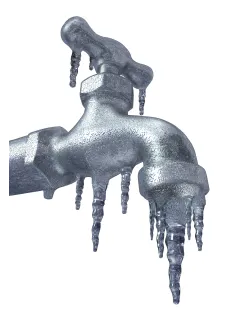Q
- My wife constantly worries about our water pipes freezing
during cold weather.
When do normal people worry
about frozen pipes and what can help prevent them.
A
- It's funny how many letters I get that start with either 'My wife…' or
'My husband…'
Here is a rule of thumb for
frozen pipes:
If the temperature crawls below
freezing and the wind is howling for more than 6-8 hours you need to be aware
that frozen pipes could occur.
One of the easiest and first
things you should do is to drain and unhook your hose outside your house and
store it for the winter.
As far as your house pipes go,
pipes that are exposed are obviously more subject to freezing than interior
pipes. If you have pipes running through
your crawlspace it would be wise to wrap them in insulation.
Insulation for pipes is
available at almost all hardware stores, is inexpensive, and is very, very
easy to install yourself. The same goes
for electric heat tape which you can apply to a pipe, set a little thermostat
and plug in.
(Quick word about heat tape -
while you can install it yourself, it is handy to have an electrical outlet
near where you want the heat tape. Call
your favorite electrician to come over and install an outlet under the house
where you want it. They will make sure
it is up to code. This will also make
the heat tape job much easier.)
The next most vulnerable pipes
are the ones in your garage (same cure) followed by pipes located in exterior
walls of your home.
To help keep those pipes in
your exterior walls from freezing open the cabinet doors under your sinks to
allow heat from house easier access.
In very cold situations you
should drip your pipes overnight. It
takes running water much longer to freeze than still water. Don't forget to drip the hot water AND the
cold-water pipes at the same time.
My rule of thumb for this is if
I even remotely think my pipes may freeze, that's enough for me to run my
faucets at night.
One other tip to consider - if
your water heater is in your crawlspace or garage, really consider getting a
blanket to wrap it in. Wrapping your
water heater will help it work more efficiently.
One last tip - in a worst-case
scenario it is
also good to know where to shut off the water to your house at your house and
at the street. Seriously. Find it and learn how to use it.
